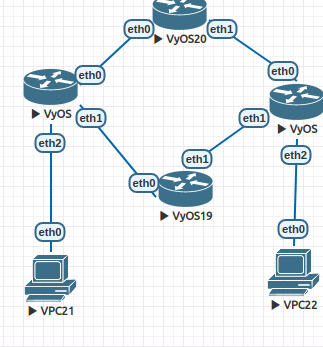Hi
I’v been testing this behevior and you are right , ecmp doesn’t seems to work as expected , I created the same scenario.
#ospf
## rt1 - ( The left router) / ecmp 10.10.10.0/24
vyos@vyos-r1:~$ show ip route
Codes: K - kernel route, C - connected, S - static, R - RIP,
O - OSPF, I - IS-IS, B - BGP, E - EIGRP, N - NHRP,
T - Table, v - VNC, V - VNC-Direct, A - Babel, F - PBR,
f - OpenFabric,
> - selected route, * - FIB route, q - queued, r - rejected, b - backup
t - trapped, o - offload failure
O>* 10.10.10.0/24 [110/3] via 172.16.1.2, eth0, weight 1, 00:02:01
* via 172.16.2.2, eth1, weight 1, 00:02:01
O 172.16.1.0/24 [110/1] is directly connected, eth0, weight 1, 00:11:12
C>* 172.16.1.0/24 is directly connected, eth0, 00:11:53
O 172.16.2.0/24 [110/1] is directly connected, eth1, weight 1, 00:11:12
C>* 172.16.2.0/24 is directly connected, eth1, 00:12:07
O>* 172.16.3.0/24 [110/2] via 172.16.1.2, eth0, weight 1, 00:11:06
O>* 172.16.4.0/24 [110/2] via 172.16.2.2, eth1, weight 1, 00:06:22
rt2 - ( The rigth router) / ecmp 192.168.0.0/24
vyos@vyosr2:~$ show ip route
Codes: K - kernel route, C - connected, S - static, R - RIP,
O - OSPF, I - IS-IS, B - BGP, E - EIGRP, N - NHRP,
T - Table, v - VNC, V - VNC-Direct, A - Babel, F - PBR,
f - OpenFabric,
> - selected route, * - FIB route, q - queued, r - rejected, b - backup
t - trapped, o - offload failure
O 10.10.10.0/24 [110/1] is directly connected, eth2, weight 1, 00:20:12
C>* 10.10.10.0/24 is directly connected, eth2, 00:20:54
O>* 172.16.1.0/24 [110/2] via 172.16.3.2, eth0, weight 1, 00:20:06
O>* 172.16.2.0/24 [110/2] via 172.16.4.2, eth1, weight 1, 00:20:06
O 172.16.3.0/24 [110/1] is directly connected, eth0, weight 1, 00:20:12
C>* 172.16.3.0/24 is directly connected, eth0, 00:20:57
O 172.16.4.0/24 [110/1] is directly connected, eth1, weight 1, 00:20:12
C>* 172.16.4.0/24 is directly connected, eth1, 00:21:13
O>* 192.168.1.0/24 [110/3] via 172.16.3.2, eth0, weight 1, 00:20:06
* via 172.16.4.2, eth1, weight 1, 00:20:0
if we check the RIB , it looks well :
vyos@vyos-r1:~$ ip route
10.10.10.0/24 nhid 41 proto ospf metric 20
nexthop via 172.16.1.2 dev eth0 weight 1
nexthop via 172.16.2.2 dev eth1 weight 1
172.16.1.0/24 dev eth0 proto kernel scope link src 172.16.1.1
172.16.2.0/24 dev eth1 proto kernel scope link src 172.16.2.1
172.16.3.0/24 nhid 25 via 172.16.1.2 dev eth0 proto ospf metric 20
172.16.4.0/24 nhid 36 via 172.16.2.2 dev eth1 proto ospf metric 20
192.168.1.0/24 dev eth2 proto kernel scope link src 192.168.1.2
vyos@vyosr2:~$ ip route
10.10.10.0/24 dev eth2 proto kernel scope link src 10.10.10.2
172.16.1.0/24 nhid 26 via 172.16.3.2 dev eth0 proto ospf metric 20
172.16.2.0/24 nhid 27 via 172.16.4.2 dev eth1 proto ospf metric 20
172.16.3.0/24 dev eth0 proto kernel scope link src 172.16.3.1
172.16.4.0/24 dev eth1 proto kernel scope link src 172.16.4.1
192.168.1.0/24 nhid 28 proto ospf metric 20
nexthop via 172.16.3.2 dev eth0 weight 1
nexthop via 172.16.4.2 dev eth1 weight 1
I understand that it should work with ecmp , but if we capture icmp form 192.168. 1.10 to 10.10.10.10 on rt2 - ( The rigth router) , it shows the following :
vyos@vyosr2:~$ tcpdump -i any icmp
15:21:08.783492 eth0 In IP 192.168.1.10 > 10.10.10.10: ICMP echo request, id 58749, seq 1, length 64
15:21:08.783617 eth2 Out IP 192.168.1.10 > 10.10.10.10: ICMP echo request, id 58749, seq 1, length 64
15:21:08.784790 eth2 In IP 10.10.10.10 > 192.168.1.10: ICMP echo reply, id 58749, seq 1, length 64
15:21:08.784841 eth1 Out IP 10.10.10.10 > 192.168.1.10: ICMP echo reply, id 58749, seq 1, length 64
15:21:09.794159 eth0 In IP 192.168.1.10 > 10.10.10.10: ICMP echo request, id 59005, seq 2, length 64
15:21:09.794248 eth2 Out IP 192.168.1.10 > 10.10.10.10: ICMP echo request, id 59005, seq 2, length 64
15:21:09.795665 eth2 In IP 10.10.10.10 > 192.168.1.10: ICMP echo reply, id 59005, seq 2, length 64
15:21:09.795738 eth1 Out IP 10.10.10.10 > 192.168.1.10: ICMP echo reply, id 59005, seq 2, length 64
15:21:10.802999 eth0 In IP 192.168.1.10 > 10.10.10.10: ICMP echo request, id 59261, seq 3, length 64
15:21:10.803855 eth2 Out IP 192.168.1.10 > 10.10.10.10: ICMP echo request, id 59261, seq 3, length 64
15:21:10.804921 eth2 In IP 10.10.10.10 > 192.168.1.10: ICMP echo reply, id 59261, seq 3, length 64
15:21:10.804964 eth1 Out IP 10.10.10.10 > 192.168.1.10: ICMP echo reply, id 59261, seq 3, length 64
15:21:11.812172 eth0 In IP 192.168.1.10 > 10.10.10.10: ICMP echo request, id 59517, seq 4, length 64
15:21:11.813146 eth2 Out IP 192.168.1.10 > 10.10.10.10: ICMP echo request, id 59517, seq 4, length 64
15:21:11.814565 eth2 In IP 10.10.10.10 > 192.168.1.10: ICMP echo reply, id 59517, seq 4, length 64
15:21:11.814611 eth1 Out IP 10.10.10.10 > 192.168.1.10: ICMP echo reply, id 59517, seq 4, length 64
15:21:12.822752 eth0 In IP 192.168.1.10 > 10.10.10.10: ICMP echo request, id 59773, seq 5, length 64
15:21:12.823577 eth2 Out IP 192.168.1.10 > 10.10.10.10: ICMP echo request, id 59773, seq 5, length 64
15:21:12.825261 eth2 In IP 10.10.10.10 > 192.168.1.10: ICMP echo reply, id 59773, seq 5, length 64
15:21:12.825312 eth1 Out IP 10.10.10.10 > 192.168.1.10: ICMP echo reply, id 59773, seq 5, length 64
15:21:13.831602 eth0 In IP 192.168.1.10 > 10.10.10.10: ICMP echo request, id 60029, seq 6, length 64
15:21:13.832484 eth2 Out IP 192.168.1.10 > 10.10.10.10: ICMP echo request, id 60029, seq 6, length 64
they always take the same path , I think it’s a issues with the lastest FRR version(8.1). if you want , could you create a case on frr ? (GitHub - FRRouting/frr: The FRRouting Protocol Suite) .

